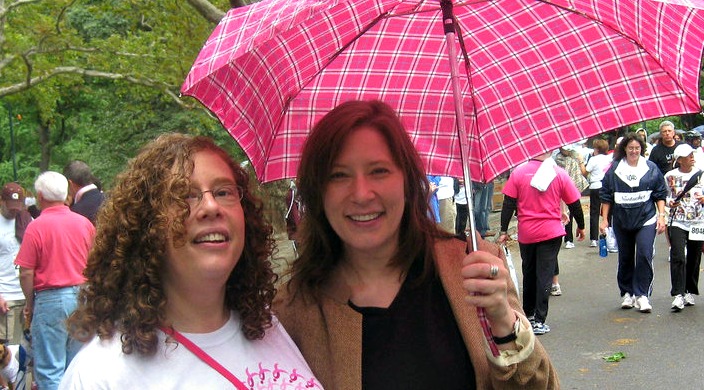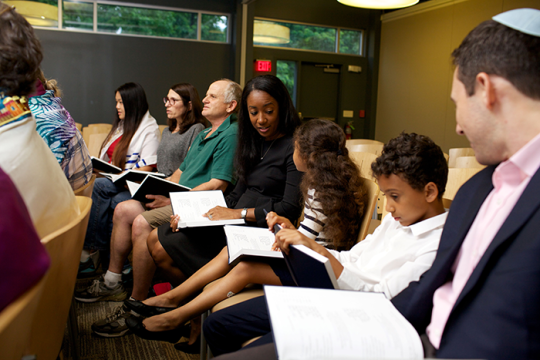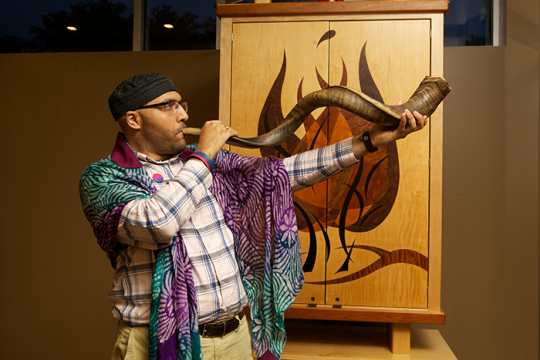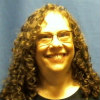
It's been well over a year since Angelina Jolie's New York Times op-ed brought hereditary breast and ovarian cancer (HBOC) syndrome to the world's attention. In that essay, Jolie announced that she had undergone a prophylactic bilateral mastectomy after she tested positive for a BRCA1 gene mutation, which significantly increased her lifetime risk for both breast and ovarian cancer.
With breast cancer awareness month upon us, October is an apt time to unpack the results of a study published early last month in the Proceedings of the National Academy of Sciences. The study revealed that Ashkenazi Jewish women with little or no family history of breast or ovarian cancer who tested positive in random screenings for a BRCA gene mutation have high rates of these diseases themselves. As a result, one of the study's authors, Dr. Efrat Levy-Lahad, director of the Medical Genetics Institute at Share Zedek Medical Center in Jerusalem, and the coordinator of the Israel Genetics Consortium, in a news article about the study, said, "We should be testing people who are still healthy at a stage when we can prevent the disease."
Not everyone agrees, however.
Current United States Preventive Services Task Force guidelines recommend genetic counseling or BRCA testing only for women whose family history suggests they may be at risk of carrying a mutation. Similarly, the American Cancer Society recommends genetic testing for individuals whose immediate family members have been affected by cancer or whose family members developed cancer at a younger age than normal for a particular type of cancer.
Further complicating the question of whether or not to test is the fact that a propensity for breast or ovarian cancer can be "hidden" in relatively small families, and in those in which a mutation is inherited from one's father. Members of families significantly decimated in the Holocaust, too, often do not have enough knowledge of past generations to make sound decisions regarding BRCA testing. Lastly, individuals must factor into their decision-making the intensely personal and complex psychosocial implications of genetic testing.
So, what's an Ashkenazi Jewish family to do?
Until qualified scientific and policy experts examine the evidence, and carefully consider all the benefits, risks, and potential impacts of modifying current guidelines to accommodate new testing criteria, Ashkenazi Jewish families should educate themselves about the basics of BRCA gene mutations and, based on personal and family history, consult with their own doctors about pursuing genetic counseling and, if warranted, testing. Here are some facts to get you started:
1. Every human being has BRCA (an acronym for BReast CAncer) genes. Healthy BRCA genes - without mutations - function as tumor suppressors, helping the body fight off rapid and unregulated cell growth. Women with a BRCA gene mutation have a significant lifetime risk of developing breast and/or ovarian cancer - often at an earlier age than expected for these diseases. Men with inherited BRCA gene mutations are at increased risk for breast and prostate cancer.
2. Both men and women can inherit a mutated BRCA gene from either parent, and have a 50% chance of passing the mutation along to each child - both sons and daughters.
3. At a rate of approximately one in 300-500, the prevalence of BRCA mutations in the general population is exceedingly rare. Within the Ashkenazi Jewish population, approximately one in every 40 people (2.5% of the population) carries a BRCA mutation, and most are not aware of their BRCA status.
4. Although a woman's risk of developing breast and/or ovarian cancer varies based on her personal family history, mutation carriers' lifetime risk of breast cancer can be as high as 87% (vs.12% in the general population) and as high as 50% (vs.1.5% in the general population) for ovarian cancer. BRCA mutations also are associated with increased risk of pancreatic cancer and melanoma, as well as with fallopian tube and primary peritoneal cancer (cancer in the lining of the abdomen).
5. In some genetic diseases, such as Tay Sachs, individuals must inherit two "recessive" genes - one from each carrier parent - in order to develop a particular disease. BRCA gene mutations, however, are "autosomal dominant," which means that inheriting just one BRCA mutation increases an individual's lifetime risk of developing cancer.
6. Some BRCA mutation carriers will never develop cancer - some because of luck of the draw and others, in the case of women, because they elect to take chemoprevention drugs or to have prophylactic surgeries to remove their breasts and/or ovaries, greatly reducing their risks. For those who do develop cancer, it often can be detected early because of the increased surveillance these individuals undertake.
7. Approximately ninety to 95% of breast cancers and 85% to 90% of ovarian cancers are "sporadic," meaning they are not caused by BRCA mutations.
8. Possible signs of HBOC include a family member with ovarian or fallopian tube cancer at any age, breast cancer before age 50, breast cancer in both breasts at any age, both breast and ovarian cancer, triple negative breast cancer, or male breast cancer.
9. Other signs of hereditary cancer syndrome include more than one relative on the same side of the family with breast cancer, ovarian or fallopian tube cancer, prostate cancer, or pancreatic cancer.
10. As noted earlier, current guidelines do not recommend population-based BRCA testing. Should you suspect the possible presence of a BRCA mutation in your family, any genetic testing should be done in consultation with a certified genetic counselor, a professional specially trained to assess individuals' personal cancer risks based on numerous factors, and to help determine appropriate risk management strategies. The National Society of Genetic Counselors can help you find genetic professionals in your area.
For more information about hereditary breast and ovarian cancer, contact Facing Our Risk of Cancer Empowered (FORCE), a national non-profit organization that provides resources, education, advocacy, and support to the hereditary cancer community. Sharsheret, a national non-profit organization, offers a community of support to young Jewish women facing breast cancer.
Related Posts

18 Jewish Reads for Tweens and Young Adults

Let Kids Read Books During High Holiday Services

